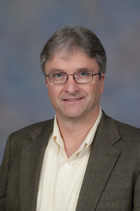 For families with children facing complicated congenital heart conditions, waiting for answers can prove torturous. But physicians with the UF Health Congenital Heart Center are helping to shorten that wait, using technology to treat and diagnose patients even if they are hundreds of miles away.
For families with children facing complicated congenital heart conditions, waiting for answers can prove torturous. But physicians with the UF Health Congenital Heart Center are helping to shorten that wait, using technology to treat and diagnose patients even if they are hundreds of miles away.
An echocardiogram, or ECHO, is an ultrasound test that uses sound waves to create a picture of the heart. This test is crucial for cardiologists making decisions about a patient’s care, but requires an expert to read and analyze it. Under the direction of Curt DeGroff, M.D., director of noninvasive imaging for the Congenital Heart Center, UF Health developed an electronic system to receive and review these images. This allows them to give instant feedback to physicians and patients all across the state.
“Patients need instant referral … and questions can be addressed almost immediately,” he says. “It’s even helped in the non-urgent cases.”
DeGroff modeled the system after ones housed in other hospitals across the country. UF Health adopted the practice a few years ago. In the old days, tapes of imaging tests would show up at the hospital in taxis, he says.
Now, DeGroff, who specializes in pediatric and congenital echocardiography, and his team receive a phone call and can quickly look at the images and make a decision.
“Most of the time we can get them immediate feedback of our opinion in terms of what they’re looking at and whether it requires immediate intervention,” he says.

It’s often so quick that patients and their families don’t even have to go home and wait for feedback. Rather, they can sit in the office and wait for the doctor to come back with the diagnosis. For places like Pensacola, where there’s a large group of doctors but no surgeons on staff, it’s a fantastic time saver, DeGroff says.
It also gives a “second eye” to physicians in private practice who may not have the luxury of bouncing ideas off another doctor.
“In this day and age, no one should be practicing alone,” he says.
With the help of Peggy Carney, manager of ancillary applications for UF Health, DeGroff’s team is moving to a “cloud-based” system, which will require less hardware and installation and will be a much quicker, secure way to get feedback from doctors.
— Kelsey Meany

